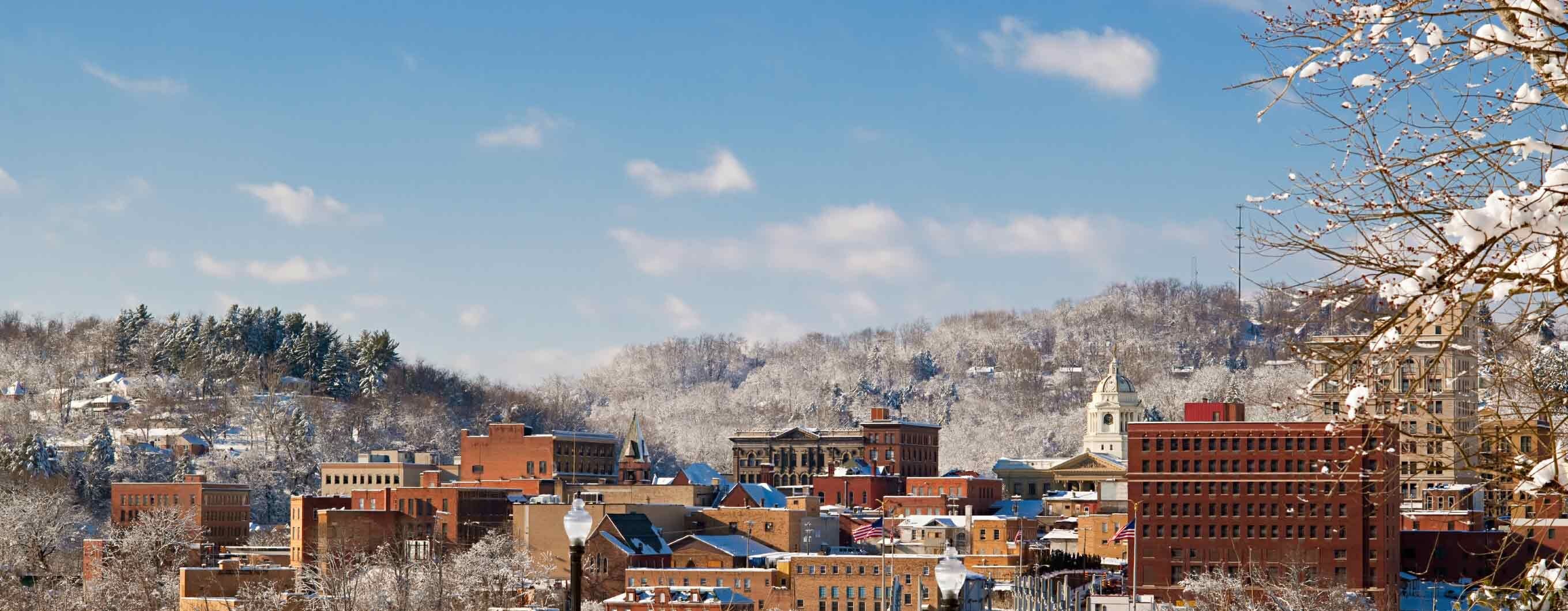
Homeowners Insurance in West Virginia
West Virginia – known as the Mountain State – is a place of natural beauty and warm hospitality. Whether you explore the great outdoors or enjoy the small-town charm of cities such as Charleston and Huntington, there’s plenty to love about calling this state home.
Considering settling down in this state? A homeowners insurance policy could help protect your home from the unexpected.
Below, we’ll provide an overview of what to consider when it comes to homeowners insurance in West Virginia, including coverage options, pricing, and tips to potentially save.
What is the average homeowners insurance cost in West Virginia?
The average cost of home insurance in West Virginia is $1,770 [1] – nearly 16% lower than the national average of $2,110 [2].
The table below shows average home insurance rates statewide over the past five years. Remember, these are state averages, and actual rates vary by city based on things like weather, home values, and crime.
Year | Average Annual Premium [3] |
|---|---|
2025 | $1,770 |
2024 | $1,113 |
2023 | $1,125 |
2022 | $1,426 |
2021 | $1,016 |
What factors typically influence my home insurance rates?
The average cost of homeowners insurance in West Virginia depends on several factors. Here's a look at what could influence your home insurance rate:
- Construction materials: Brick or concrete homes and properties tend to be more wind and fire-resistant than wood-framed ones, which may be considered higher risk due to fire susceptibility.
- Home age and condition: If you own an older home, your charm-filled abode might come with outdated plumbing, old wiring, or aged roofing. These elements could lead to higher premiums due to the increased risk of damage or failure. On the flip side, newer homes might benefit from modern construction codes and safer materials, which could lower your rates.
- Home value: Your home's value matters because it determines how much it would cost to rebuild if it's completely damaged. Insurance providers often check the home's purchase price and appraisal to set coverage limits.
- Coverage limits and deductibles: Your choices for coverage and deductibles can affect what you pay. Higher coverage limits may increase your premium, while selecting a higher deductible can sometimes lower it. Adding optional coverages, such as flood or earthquake protection, may also raise your overall cost.
- Home-based business: Running a business from home could increase your premium, since you might need coverage for inventory, equipment, and supplies.
- Home features: Certain features could make your house riskier to insure. For example, if you have a swimming pool or trampoline, your premium may be higher due to the increased risk of injury. Outdated electrical, plumbing, or heating systems could also raise your rate because they're more likely to cause damage.
- Proximity to emergency services: Dwelling near a fire station could be seen as a benefit by some insurers. Quicker emergency response times may help reduce potential damage to your home during a disaster.
Coverage and availability can vary depending on the underwriting carrier. Consult with a licensed insurance producer to determine your eligibility and explore available options.
Common insurance discounts in West Virginia
If you're a homeowner in West Virginia, there are several ways you may be able to lower your insurance premiums through discounts. Listed below are some of the common insurance discounts you could find in West Virginia.
Here's what to look out for:
- Multi-policy discount: If your insurance company provides more than just homeowners insurance, like auto or renters insurance, you may be able to save by bundling. Buying multiple policies from the same company can sometimes earn a multi-policy discount.
- New home discount: If your home is newly built or has undergone significant recent renovations, you might qualify for a discount. Homes with updated wiring, plumbing, and roofing are generally considered less risky to insure.
- Security systems discount: Home security features could also lead to potential savings. West Virginia homeowners who install burglar alarms, deadbolts, or professionally monitored systems may qualify for a security discount. These upgrades could help lower the risk of theft and make your home less risky to insure.
- Claims-free discount: A claims-free discount is another common way to save. You might get a discount if you’ve had few or no insurance claims over a certain number of years, your insurance company in West Virginia might offer you a reduced premium as a reward for maintaining a low-risk record.
Not every insurance company in West Virginia offers every discount, so it's worth comparing multiple home insurance quotes in West Virginia before locking in your policy coverage.
What does West Virginia home insurance typically cover?
Own a property or home in the Mountain State? West Virginia homeowners insurance could help protect you financially if something unexpected happens to your home or belongings.
A standard home insurance policy in West Virginia might include the following:
- Dwelling coverage: This insurance coverage helps protect the structure of your home itself. If a tornado fire, or hailstorm damages your house, your policy may help cover the cost to repair or rebuild.
- Other structures: Coverage usually extends to detached structures on your property – like a garage, shed, barn, outdoor fireplace, fence, swing set, or wall. Recreational items, such as trampolines or swimming pools, might also be included. However, because they pose a higher risk, you might need additional liability coverage.
- Personal property coverage: This part of your policy helps cover personal belongings inside your home. It can include furniture, clothing, appliances, and your heating or cooling systems. If you own expensive items such as jewelry, fine art, or collectibles, you might need to purchase extra coverage to fully protect them.
- Personal liability coverage: Liability coverage helps protect you financially if someone is injured on your property and pursues a claim or lawsuit. It could help pay for legal costs, settlements, and medical expenses.
- Loss of use (or additional living expenses): If your home becomes unlivable after a covered event, this coverage helps pay for temporary living expenses, such as hotel stays or meals.
Additional West Virginia insurance coverage options
In West Virginia, you might have the option to add extra protection to your home insurance policy or purchase separate coverage for specific risks. While standard homeowners insurance covers the basics, there are some important add-ons worth considering:
- Flood insurance: West Virginia consistently ranks among the highest-risk states for flooding. Your standard homeowners insurance in WV typically won’t cover flood damage. If you live in a flood-prone area, you might want to purchase a separate flood insurance policy through a private insurer or the National Flood Insurance Program (NFIP).
- Umbrella insurance: This insurance policy offers extra liability coverage beyond your typical home, auto, or other insurance policies. It may apply when claims exceed the limits of your underlying policies, offering additional protection against large liabilities, lawsuits, and judgments.
- Sewer or water backup: This add-on coverage can help protect you if sewage or water backs up into your home or if your sump pump overflows. It may help with cleanup and certain repair costs, including repairs to the sewer line within your property boundaries.
What West Virginia residents need to know
Homeowners in West Virginia may want to keep these things in mind:
- Flooding: West Virginia homeowners may experience flooding. It might be helpful to explore the flood insurance options available to you.
- Don't under-insure your home: With rising construction costs, ensure your policy's dwelling limit reflects today's rebuilding rates, not last year's market value.
- Increasing property values: As real estate values rise, it's important to review and update your policy to ensure you have adequate replacement cost coverage.
Tips for lowering home insurance rates
If you're looking to reduce your annual premiums and get the best homeowners insurance in West Virginia, you're not alone. Here are some smart and simple tips that may help lower your house insurance policy.
- Raise your deductible: Consider raising your deductible, which could lower your monthly bill. However, make sure you could cover that amount out of pocket if a covered event happens.
- Don't just auto-renew; shop around: It's easy to let your policy auto-renew every year, but that could cost you. Instead, obtain at least three quotes when your renewal date approaches. Different insurers weigh things such as West Virginia ZIP codes, proximity to a fire station, or your home's age in different ways, so shopping around could reveal a lower rate for the same (or better) coverage.
- Install preventive devices: Smoke detectors, carbon monoxide alarms, water leak sensors, and smart locks could help you qualify for discounts. Eligibility and qualifications for these programs might vary by insurer.
- Strengthen your credit: In West Virginia, your credit score could influence your premium. Pay bills on time, keep balances low, and avoid new debt before policy renewals.
Ask about hidden discounts: From senior savings to energy-efficient home credits, many discounts aren't advertised. Don't be shy – ask your agent if there are any extra perks you might qualify for.
Looking for homeowners insurance in a different state?
Exploring home insurance options outside of West Virginia? Use the interactive map below to select your state:
Still have questions?
Curious to learn more about West Virginia home insurance? Here are some frequently asked questions:
Is West Virginia homeowners insurance required by law?
Homeowners insurance isn’t legally required by the state of West Virginia. However, if you have a mortgage, your lender would likely require you to maintain an active policy to protect their investment.
Even if home insurance isn’t required, having homeowners insurance is often recommended to help protect against financial losses due to property damage, liability claims, or natural disasters.
Is West Virginia income tax-free?
No, West Virginia imposes a state income tax. The state’s income tax system has rates ranging from 2.36% to 5.12%, depending on income levels.
How much is West Virginia condo insurance?
The cost of condo insurance in West Virginia varies based on factors like the unit’s location, coverage amount, and insurer. On average, condo insurance in West Virginia costs $255 [4] per year, with additional coverage options available for personal property, liability, and loss of use.
Sources
1, 2 Information from NerdWallet.
3 Information from Insurance Information Institute, Yahoo! Finance, Policygenius, and NerdWallet.
4 Information from NerdWallet.
Figures reflect averages from publicly available sources as of September 2025.
This article is for informational purposes only and was compiled from sources not affiliated with Hippo. While we believe this information to be reliable, we do not guarantee its accuracy or completeness. For any insurance-related decision, please consult your licensed insurance producer.



